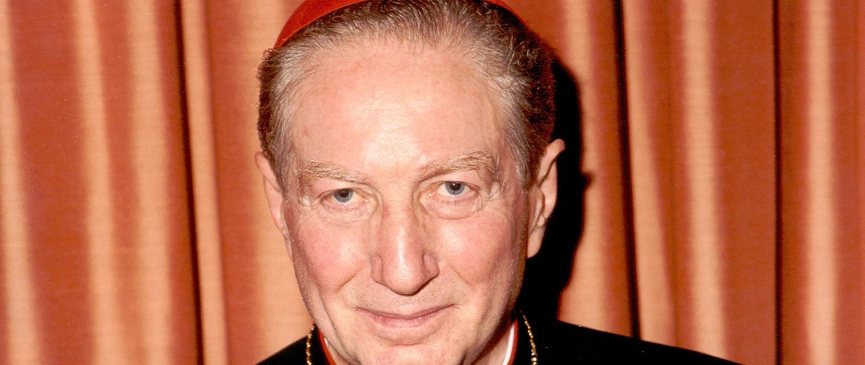Main content
Carlo Maria Martini Prince of Asturias Award for Social Sciences 2000

I am deeply grateful for having been given this award. It is a great honour for me, and encourages me in my service towards the Church and modern society.
I know that my commitment to establishing a dialogue between believers and non-believers and between groups within society who have difficulty reaching mutual understanding has weighed in the decision.
I wish to say that the books of the Bible lie at the root of this service I have tried to offer (with the help of so many others - my teachers, colleagues and co-workers - all of whom I send my thanks to). I have had the good fortune of being able to carry out scientific study of these texts for many years, with particular emphasis on text criticism and hermeneutics. I have thus been able to experience in myself and in many others how the Bible is the fundamental book of our history and the book for the future of Europe.
Roads towards spiritual depth leading to the root causes of Humanity's major problems are born out of close, continuous reading of Hebrew and Christian Holy Scriptures; they allow a common basis for dialogue with all men of good will, be they of other religions or non-believers, to be established. By meditating on the Holy Scriptures for a long time I realised that what they produced in me, in my mind and my heart (the "burning heart" that the two disciples from Emmaus refer to in Luke 24,32) was also to be found in the profound experiences of others, particularly the young.
I can thus say that it is the study of the Bible and meditation on the Bible that have led me towards dialogue.
Today a spirit of dialogue is more necessary than ever. But to be able to have this spirit it is first necessary to have delved deeply into ones own identity. The Bible, especially the Gospels and the letters of Saint Paul, are like a mirror, reflecting ourselves as we truly are; they lead us to an understanding of who we are and what we are destined to become.
To hold a dialogue you must also cultivate a kind of spirituality based on silence, on listening. Familiarity with the Bible teaches above all how to listen: "Hear, O Israel" (Dt 6,4); Jesus often repeats the request: "Hear" (Mt 4,3), "If you have ears to listen, then listen" (Mt 4,23). But listening implies silence. Nowadays anybody holding public office should have moments of prolonged silence during his or her working day; the greater the responsibility, the longer the silences. The Biblical episode of Elias in the cave on Mount Oreb teaches us that the voice of God is not to be found in the impetuous wind, in the earthquake or in fire, but instead in "the faint murmur of silence" (1 Kings, 19,13). Silence opens the heart and mind to hearing essence and truth.
Finally, for there to be dialogue, you must have sincere liking for the other person, approach him trustingly, be ready to learn from anyone who speaks sincerely and honestly.
A dialogue on the key facets of life is now needed if cultures, especially in Europe, are to survive and progress, and if we are to avoid being relegated to mere spectators of the "clash of civilisations" that some scholar has predicted as being a consequence of the end of the two major ideological blocks.
In a world that is becoming ever more unified from an economical and financial standpoint, where you can communicate in real time between anywhere in the world and anywhere else, what is needed is a style of dialogue and listening that also includes consideration of social and economic problems and allows a shift from the globalisation of markets and information exchange towards a globalisation of solidarity. Pope John Paul II has frequently called for this, and has invited people for the Jubilee years to "create a new culture of solidarity and international co-operation where everybody ... accepts their responsibility for building an economic model at the service of the individual" (John Paul II, Incarnationnis Mysterium, number 12). This means interpreting and organising the economy by recognising its values and limits, and its subordination to ethics. "this also means searching for ideal legal tools for effective supranational control of the economy; an economic community has to correspond with an international civil society, able to express forms of political and economic subjectivity inspired in solidarity and the quest for the common good, in a broader vision able to include the whole world". (John Paul II, To the teachers and students of the 'Luigi Bocconi' Business University of Milan, 20 November 1999, number 4).
We could thus deal with the burning questions of the day: peace between ethnic groups and religions, particularly in the Middle East; human rights and the defence of lifelong personal dignity in every country in the world; environmental problems and protecting the earth against the degradation that threatens it. The believer will be guided by the certainty that underlying the paths of man there is a grace from the Holy Spirit leading the struggle against all that is absurd and unjust. Anyone who at least has confidence in life itself, even though he may have no particular religious faith, will thereby find fellow travellers to share his yearning for the dignity of every man and woman, and of every country on earth.
The great civil and religious tradition of this land of Asturias, one of the founding centres of European culture, obliges us to look towards the future with a hope that in itself can spur us on, in the face of the difficulties and darkness of the present.
End of main content
